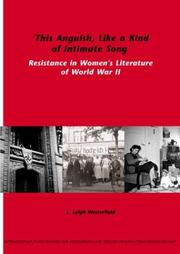| Listing 1 - 1 of 1 |
Sort by
|

ISBN: 9042011483 9401201072 1417566701 9781417566709 9789042011489 Year: 2004 Volume: 74 Publisher: Amsterdam New York, NY Rodopi
Abstract | Keywords | Export | Availability | Bookmark
 Loading...
Loading...Choose an application
- Reference Manager
- EndNote
- RefWorks (Direct export to RefWorks)
The romanticized image of the heroic male resistance fighter in World War II belies a truth that is both darker and more personal. This literary history explores, for the first time, the reality of European women's roles in fighting Nazism. By comparing the resistance literature of French and German authors-both famous and more obscure-this innovative book links the traditional gender expectations for women and the conventions of their everyday lives with their unique forms of resistance. Theirs was an opposition grounded in the ordinary, beyond the sphere of political violence. Women were long regarded as outsiders to combat and politics, with no stake in upholding resistance myths. Women authors therefore freely rendered the personal and moral landscape of the resister's world in a new vocabulary. They revised standard rhetoric and replaced heroism and bullets with the values of home, human relationships, and candid acknowledgement of the sorrow, fear, and uncertainty of war. A groundbreaking study for students of European history, women's studies, peace studies, or comparative literature, this volume is also accessible to a general audience interested in the role of women in World War II.
82:93 --- 82:396 --- 82:396 Literatuur en feminisme --- Literatuur en feminisme --- 82:93 Literatuur en geschiedenis --- Literatuur en geschiedenis --- Women authors [French ] --- Political activity --- Women authors [German ] --- World War, 1939-1945 --- Underground literature --- Underground movements --- France --- Anti-Nazi movement --- Germany --- Literature and the war --- Women --- Social conditions --- Women authors, French --- Women authors, German --- Political activity. --- Underground literature. --- German women authors --- French women authors --- Underground printing plants
| Listing 1 - 1 of 1 |
Sort by
|

 Search
Search Feedback
Feedback About UniCat
About UniCat  Help
Help News
News